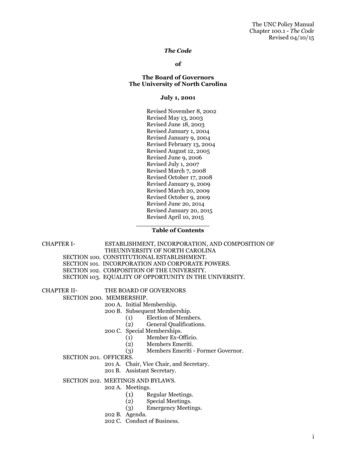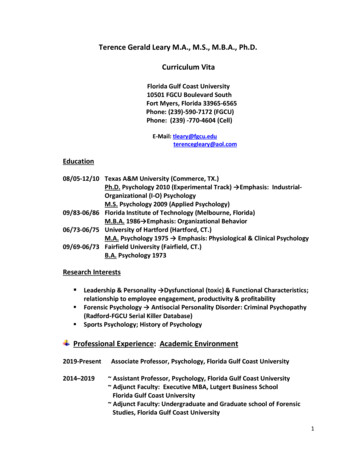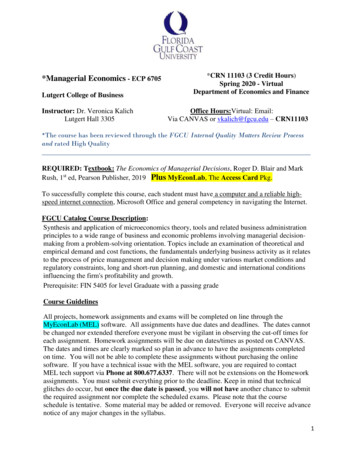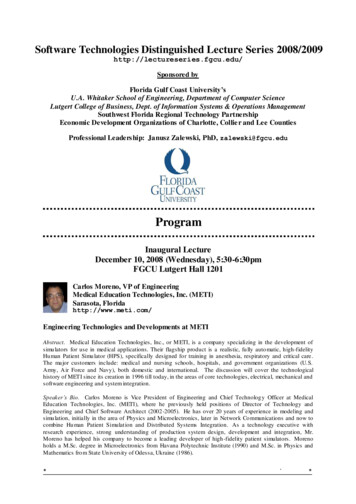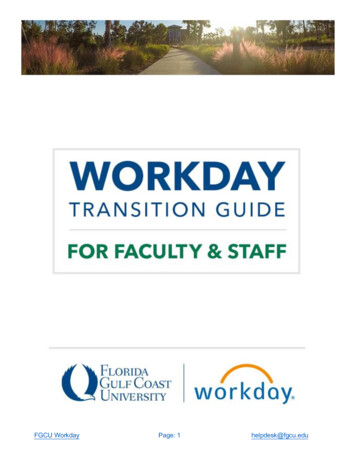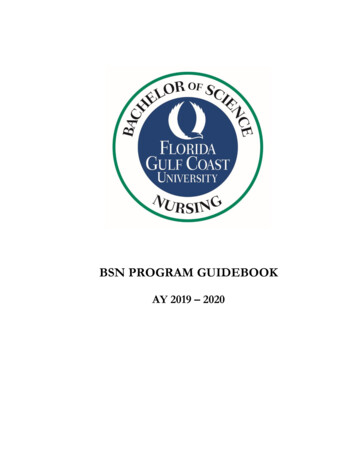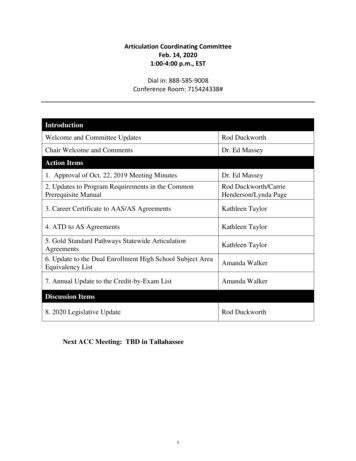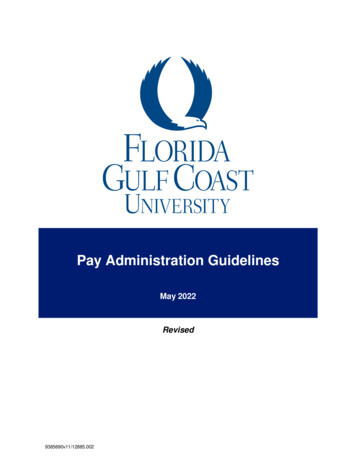
Transcription
Pay Administration GuidelinesMay 2022Revised9385690v11/12885.002
Table of ContentsTable of Contents . iIntroduction . 1Compensation Philosophy . 2Roles and Responsibilities. 4Staff Salary Structure . 6Program Maintenance . 6Job Families . 7Job Categories . 8Job Levels . 8Staff Salary Structure. 9Staff Salary Administration . 10Setting Starting Salaries . 10Managing Salaries within a Pay Grade . 11Salaries above Grade Maximum . 12Special Pay . 12Bonus Payments . 15University-Wide Increases . 16Job-Based Changes . 18Incumbent-Based Changes . 19Appendix A – Staff Market Pricing Guidelines . 23Step 1: Identifying Benchmark Jobs. 23Step 2: Identify Appropriate Survey(s) . 23Step 3: Match FGCU Jobs to Comparable Jobs in Surveys . 24Step 4: Select Appropriate Survey Scope/Cut. 24Step 5: Make Necessary Adjustments . 25Step 6: Update the Data to a Common Point in Time. 26Step 7: Develop the Consensus . 26Appendix B - Higher Education Comparison Market Institutions List . 27Appendix C – Glossary of Terms . 289385690v11/12885.002i
IntroductionThese pay administration guidelines serve as the standard for administering Florida Gulf CoastUniversity’s (FGCU’s) staff compensation programs. The program has been designed to providecompetitive, fair, and equitable compensation in order to attract, retain, and engage employees.To this end, we will: Provide salary opportunities that:– are based on job responsibilities,– are competitive within the markets in which FGCU competes for talent;– promote internal equity with jobs that have similar responsibilities, and;– reflect the University’s financial resources. Recognize and reward sustained contributions towards achieving the University’s vision andstrategic objectives, and high levels of performance and expertise Ensure understanding of the compensation program through open and clear communication,accessible information, and continued training for leaders, managers, and staff on keycomponents of the programThese guidelines are intended to be a reference for the ongoing consistent administration ofcompensation programs. Human Resources (HR) is responsible for administering the program.The University will make an earnest effort to update this program regularly (e.g., salary programupdates, benchmarking reviews) in order to keep it current.While we intend to lend stability in our policies and practices, FGCU reserves the right tointerpret the policies, rules, sections, and provisions contained in these guidelines, as it deemsappropriate in its sole discretion. The University also reserves the right, in its sole discretion, toamend, modify, change, cancel, terminate, or withdraw any or all of the policies, rules, sections,and provisions of these guidelines at any time, unilaterally, with or without prior notice.These guidelines, as well as its attachments and all subsequent revisions, supersede and/orreplace all policies, rules, and salary program descriptions issued previously.9385690v11/12885.0021
Compensation PhilosophyThe compensation philosophy is the foundation of the compensation program. This philosophyserves as a framework for compensation benchmarking and administration at FGCU. Thephilosophy addresses: The overall vision for the program, which is consistent with the University’s core mission, The balance between external competitiveness and internal equity, comparison markets forevaluating salaries and managing compensation, and How the program will be administered and communicated.VisionFGCU will achieve national prominence in offering exceptional value in highquality educational programs that address regional and statewide needs. Ourprograms, firmly grounded in the liberal arts and sciences, will employ emerginginstructional technologies. Possessing an entrepreneurial spirit, graduates willbe well prepared for productive lives as civically engaged and environmentallyconscious citizens with successful careers, ready to pursue further education.MissionStatementFGCU, a comprehensive institution of higher education, offers undergraduateand graduate degree programs of strategic importance to Southwest Florida andbeyond. FGCU seeks academic excellence in the development of selectedprograms and centers of distinction in science, technology, engineering andmathematics (STEM) disciplines, health professions, business, and marine andenvironmental sciences. Outstanding faculty and staff supported by a strongcommunity of advisors prepare students for gainful employment and successfullives as responsible, productive and engaged citizens. FGCU emphasizesinnovative, student-centered teaching and learning, promotes and practicesenvironmental sustainability, embraces diversity, nurtures communitypartnerships, values public service, encourages civic responsibility, andcultivates habits of lifelong learning and the discovery of new knowledge.CompensationProgramFGCU aims to provide a total rewards package that reflects both externalmarket and internal equity balanced with fiscal responsibility. In addition to basecompensation, the University focuses on providing benefits, professionaldevelopment, career opportunities, work-life balance, and a mission-drivenenvironment and inclusive culture.MarketComparatorsThe University benchmarks salaries against the markets within which itcompetes for talent, which may vary across the institution. Market comparatorsinclude higher education institutions and organizations outside of highereducation as appropriate.Pay PositioningFGCU generally targets the market median for competitive pay positioning. Thismay vary from job to job based on market data and individual factors, such as(but not limited to) education, experience, skills, certifications, internal equity,high demand roles, or jobs with recruitment or retention difficulties.Beyond MarketFactorsThe University promotes fair and equitable salaries inclusive of factors thataffect compensation decision-making such as level of education, priorexperience, length of service, performance, and overall contributions to theUniversity.9385690v11/12885.0022
ProgramCommunicationFGCU is committed to transparency regarding the development andadministration of compensation programs. Clear and easily-understood payadministration guidelines will be developed and regularly communicated to allstakeholders via different vehicles.PayAdministrationThe development, approval, and endorsement of the compensation philosophywill be the responsibility of Human Resources, University Leadership, and thePresident. Human Resources will have ultimate responsibility for the periodicreview, maintenance, and updates to tools, processes, procedures, and policies.9385690v11/12885.0023
Roles and ResponsibilitiesTo ensure that the program is administered in a consistent, impartial manner, the roles andresponsibilities for key constituents involved in compensation decision making are defined in thetable below:SeniorLeadershipTeam Serve as a champion/sponsor for compensation program development,implementation, and maintenance Foster transparency regarding the University’s compensation programs throughconsistent, clear, and open communication Develop and communicate compensation philosophy and goals to the University atlarge Prioritize funding of resources to maintain the salary program, while acknowledgingbudget limitations or constraints Reinforce accountability for University leaders and managers with respect to thecompensation programs Approve aspects of compensation program design, administration, and maintenance,as appropriateHumanResources Lead the efforts to develop, administer, and maintain the compensation programs, incollaboration with University leadership Provide strategic and operational advice to University leadership regardingcompensation issues, market trends, and relevant regulations Serve as a trusted advisor for University leadership and managers when makingcompensation decisions Communicate openly regarding compensation programs to foster transparency andunderstanding of the University’s compensation programs Provide tools to managers and employees to promote the development of andupdates to job descriptions for staff Commit time and resources to the regular maintenance of the compensationprograms; specifically the collection and evaluation of market data, competitivemarket assessments, and recommendations for adjustments to the compensationprograms to maintain alignment with market practices Establish procedures to evaluate the effectiveness of compensation programs,practices, and policies9385690v11/12885.0024
DepartmentHeads andManagers Collaborate with Human Resources regarding compensation actions andrecommendations Actively participate in education on the specifics of the compensation program (attendtrainings, become familiar with tools and other resources available, etc.) Maintain knowledge of job responsibilities and requirements for function/area ofresponsibility, and the corresponding characteristics and documentation for staff inthose jobs Establish standards for performance and provide frequent and meaningful feedback Communicate openly regarding compensation programs to foster transparency andunderstanding of the University’s compensation programs Serve as a trusted advisor for staff on development and career progression topicsStaff Maintain documentation regarding job responsibilities and requirements, andparticipate in regular maintenance of documentation Actively participate in education on the specifics of the compensation program (attendtrainings, become familiar with tools and other resources available, etc.) Communicate openly and regularly with department head or manager to address anyissues and concerns9385690v11/12885.0025
Staff Salary StructureFGCU maintains a market-based compensation program that supports the institution’s strategicvision, mission, values, and its diverse staff population. The staff salary structure is developedusing survey salary information gathered from market benchmarking and contains differentiatedsalary ranges. Such a structure: Is relatively simple with less frequent maintenance and reevaluation of job grades requireddue to flexibility built into the structure Allows for increased flexibility in cross-functional job movement Allows for balancing pay for both the job and the person, rather than to an inflexible controlpointFGCU’s staff salary structure consists of pay grades that represent a continuum of salariesbased on the market for a range of positions. The chart at the end of this section provides the2021-2022 staff salary structure, which includes: A minimum, the lowest salary for jobs in the grade. Generally, an employee will not be paidbelow the minimum of the salary range associated with that employee’s job. However,through the transition of changing titles and pay grades an employee may be paid at or abovethe old pay grade associated with the position until it is fiscally feasible to increase the salaryto the new minimum of the salary range of the new pay grade. The midpoint, the "middle" of the grade. The midpoint is the salary which is considered to bea fair and equitable rate of compensation for an employee who is fully qualified for the jobfrom the standpoint of training and experience, and whose demonstrated performance on thejob over a period of time is satisfactory in all respects. A maximum, the highest salary for jobs in the grade. Generally, an employee will not be paidabove the maximum of the salary range associated with that employee's job.Program MaintenanceJob DescriptionsJob descriptions are a critical component for compensation programs and are inputs for manyprocesses, including workforce planning, professional development, recruitment efforts, marketcompetitiveness studies, FLSA classification/review, and other compliance activities. Jobdescriptions are not detailed work/desk instructions, but rather convey expectations for jobduties and performance. Because staff jobs are assigned to pay grades based on their content,role, and responsibilities, it is important that job descriptions be current, accurate, and complete.Job descriptions should be reviewed annually during the performance evaluation process andwhenever a job is vacated.For every staff job, a job description will be developed by the manager and approved by HumanResources. Human Resources will provide a job description template to managers for thisprocess. Human Resources is responsible for archiving current job descriptions for all staff jobs.9385690v11/12885.0026
Maintaining the Salary RangesThe salary ranges (minimum, midpoint, and maximum) will be adjusted regularly to keep up withthe market. The ranges are generally increased each year based on average annual salaryrange adjustments within higher education and general industry. This information is available inannual salary guidelines as published by compensation planning resources such asWorldatWork or Segal. Note that this adjustment is to the ranges of each structure, notindividual salary. Any changes to the ranges are subject to the availability of financial resourcesand must be approved by the Senior Leadership team.Periodically, (approximately every three to five years), the University will complete a thoroughmarket analysis, including a market assessment of staff benchmark jobs to gauge significantchanges in the market. This may result in some additional adjustments to the ranges or gradeassignments.Placement of Jobs in the Pay StructureBenchmark jobs are assigned to pay grades primarily based on their market value. These jobsare typically assigned to the grade with the closest grade midpoint to the median (i.e., 50thpercentile) market data for jobs within that grade. The majority of jobs at FGCU are benchmarkjobs.For other jobs, market data may not be available; these are called “non-benchmark” jobs. Nonbenchmark jobs include jobs that are created to meet a unique need at FGCU, jobs that are ablend of multiple functions, and jobs for which viable survey data is not available. Nonbenchmark jobs are assigned to pay grades through a process of comparing them to similarbenchmark jobs by considering: Skills and Knowledge: The formal/informal expertise needed to perform the duties of the jobon a day-to-day basis. Example: Accounting rules, standards, and procedures Impact: The impact that a job has on key institutional imperatives. Example: Financial healthor effectiveness and quality of services provided within the institution Scope of Responsibility: The breadth or range of the job’s operational influence within theinstitution. Example: Institution-wide, division, or departmentHuman Resources, in consultation with the appropriate Department Head, reviews the internalequity of all job assignments before final approval.Job FamiliesJob Families are groups of jobs affiliated with one another that involve similar duties and requiresimilar skills, knowledge, training, or expertise. Job families differ from departments, in thatdepartments are based on organizational or reporting structure, while job families are based onthe similarities noted above.9385690v11/12885.0027
Job CategoriesJob categories describe the overall nature of work. The three job categories used at FGCU areSupport, Professional, and Management.Support: Support jobs are those jobs which provide organizational related support or service(administrative or clerical) OR roles operating in a “hands on” environment in support of dailyoperations. The majority of time is spent in the delivery of support services or activities, typicallyunder supervision. The jobs in this category are generally paid on an hourly basis and classifiedas non-exempt under the Fair Labor Standards Act (FLSA), although assignment to thiscategory is not a recommendation of FLSA status. Higher level support jobs may be responsiblefor overseeing well defined tasks performed by nonexempt employees, but are not responsiblefor employee development. Jobs in this category may also oversee student workers and/orvolunteers.Professional: Professional jobs typically oversee the design, implementation, and delivery ofprocesses, programs and policies using specialized knowledge and skills normally acquiredthrough advanced education or specialized training. Professional jobs are generally exemptjobs under the FLSA with responsibility in a field, function, or specialty area. A professional staffmember may oversee the work of two or fewer direct reports and/or manage processes andprograms; however, this is incidental to the primary role of the job.Management: Management jobs are those jobs which accomplish their goals andaccountabilities primarily through the management of staff in operational and/or strategic roleswithin a specified job family/function. Jobs in the management category have the managementand development of people as a major accountability, and generally have direct reports. Themajority of time is spent overseeing their areas of responsibility, planning, prioritizing and/ordirecting the responsibilities of employees.Job LevelsJob levels have been developed within each of the above categories. Each level describescharacteristics of jobs that will be assigned to a level, including organizational impact,complexity, leadership responsibility, as well as knowledge and experience requirements.Each job at FGCU has been reviewed, compared to the level criteria and assigned to the levelthat best describes the job.9385690v11/12885.0028
Staff Salary Structure12Annual Pay al2MinimumMidpoint11 26,000 31,000 39,00050%--12 27,300 34,100 41,00050%10.0%13 30,000 37,500 45,00050%10.0%14 33,100 42,200 51,30055%12.5%15 37,300 47,500 57,80055%12.5%16 41,900 53,400 64,90055%12.5%17 47,200 61,400 75,50060%15.0%18 54,300 70,600 86,90060%15.0%19 62,500 81,200 100,00060%15.0%20 72,100 97,400 122,60070%20.0%21 86,600 116,900 147,20070%20.0%22 102,000 140,300 178,50075%20.0%23 122,500 168,400 214,40075%20.0%24 147,000 202,100 257,30075%20.0%Range spread is the percent distance from grade minimum to grade maximum, defining the range of pay per grade.Midpoint progression is the percent increase from one grade’s midpoint to the next grade’s midpoint.9385690v11/12885.0029
Staff Salary AdministrationSetting Starting SalariesThe salary program’s grades are wide enough to accommodate a variety of experience,knowledge, skill, qualification, and performance levels. Generally, all staff can expect to be paidwithin the salary guidelines associated with their job’s pay grade.Setting a starting salary involves a review by Human Resources of a job’s responsibilities andrequirements as well as the skills and experience of the candidate, using the salary rangeassociated with the job’s grade. Final starting salaries must be reviewed and approved byHuman Resources and the manager before they are implemented.Step 1: Review the job and determine its grade assignment (Human Resources)—if the jobcurrently exists at the University, proceed with Step 2.If the job is new to FGCU, Human Resources will determine if the job is a benchmark job. Thismeans that jobs with similar responsibilities and skill requirements are typical in the market andreliable salary data can be found in published surveys, using the same comparison market aspreviously established. In the case of a benchmark job, refer to the “Market Pricing Guidelines”section for guidelines on benchmarking the job and reference the resulting survey data to assignthe job to the most appropriate grade (i.e., the grade with the midpoint closest to the surveymedian).Non-benchmark jobs include jobs that are created to meet a unique need at FGCU, jobs thatare a blend of multiple functions, and jobs for which good salary survey data are not available. Ifthe job is a non-benchmark job, Human Resources and the manager will evaluate the jobrelative to its most similar job(s) at the University based on: Knowledge and Skills Impact Scope of ResponsibilityStep 2: Review internal equity—before any salary is finalized, Human Resources will conducta review of salaries of current staff members in similar jobs to ensure internal equity. If theindividual will be working in more than one job at the University, Human Resources willdetermine the appropriate grade and salary for the incumbent.Step 3: Review skills and experience of the individual—once the grade for the job has beendetermined, the individual salary will be set within the guidelines for the grade collaboratively byHuman Resources and the candidate’s manager, based on the individual’s skills andqualifications as defined in “Managing Salaries within a Grade.” Together, they will evaluate thenew employee based on their knowledge, skills, and relevant experience. This evaluation willresult in a recommended salary between the minimum and the midpoint of the pay grade.As a general guideline, if an individual has no prior relevant work experience, their pay will beset at the minimum of the grade for the job. Additionally, pay rates for new employees will9385690v11/12885.00210
generally not exceed the midpoint of the grade for their job without approval from HumanResources and a Vice President, unless exceptional circumstances can be demonstrated.Step 4: Final approval of salary level for offer—Final salary recommendation up to themidpoint of the range is submitted via offer transaction in Workday to the Compensation team.Offers exceeding the midpoint will also be routed to the appropriate Vice President for approval.Managing Salaries within a Pay GradeThe salary structure consists of a series of grades that are designed to provide competitivesalary opportunities for the responsibilities and requirements of jobs at FGCU. The guidelinesbelow provide direction on how salaries should be managed within a grade, taking into accountboth the external market and accumulated skills and individual contribution. Individuals within ajob will progress through the grade based on growth in their knowledge and experience, as wellas performance.1st Quartile(Minimum to¼ Mark)2nd Quartile(¼ Mark toMidpoint)3rd Quartile(Midpoint to¾ Mark)4th Quartile(¾ Mark toMaximum) New to role and/or field, may have limited prior experience depending on position incareer cycle On steep learning curve, building both skills and knowledge as well as ability tohandle job responsibilities Performs some/most job responsibilities effectively Possesses all/most of the base knowledge and skill requirements, but may need tobuild upon them through experience May still be learning some aspects of job or developing expertise to handle themmore independently and effectively Exhibits many or most desired competencies to perform job successfully Performs all aspects of job effectively and independently Experienced in the job and possesses required knowledge and skills Exhibits desired competencies to perform job successfully Seasoned and proficient at building job responsibilities Expert in all job criteria Possesses broad and deep knowledge of own area as well as related areas Possesses depth and breadth of experience in the job, specialized skills andsignificant value Serves as expert resource and/or role model/mentor to others in similar jobs or toother areasAll incumbents can generally expect to be paid within the guidelines associated with their job’spay grade. As a general policy, no one should be paid above the pay grade maximum or belowthe pay grade minimum.9385690v11/12885.00211
Salaries above Grade MaximumEmployees whose salaries are above the maximum of their pay grade will not be eligible forincreases to base salary. For employees whose current salaries are above the maximum of thesalary range for their job, any additional increases will be provided as a lump sum cash paymenton the effective date of the increases. Employees whose pay is close to the maximum mayreceive an increase partially as an increase to base salary, and partially as a lump sum (seeexamples below). As pay grades are adjusted for inflation and/or market pressure, employeesalaries that were previously above the grades maximum may again fall within the structure.Examples of Increases at the Maximum of the alaryIncreasePaymentSalaryEmployee 114 52,850 51,3002% 53,907 0 1,057 52,850Employee 218 85,500 86,9002% 87,210 1,400 310 86,900Employee 322 160,400 178,5002% 163,608 3,208 0 163,608Special PaySpecial pay can be provided for a variety of reasons as listed below.CounteroffersUsed to retain an employee with a written job offer from an external organization that iscomparable to the job the employee holds at FGCU. Counteroffers are initially treated the sameas market reviews. Otherwise, the college/department provides a written justification from theappropriate Vice President on the ways the retention of the specific employee benefits theuniversity.Market AdjustmentAn adjustment that is made to recognize changes in the competitive market salary for a jobusing the market pricing process described later in this document. Market adjustments areunlikely to occur often, because the salary program is based on benchmarking and is updatedregularly to ensure continued competitiveness. Occasionally, however, unusual marketcircumstances may warrant an adjustment.Equity AdjustmentAn adjustment that is made to ensure that an individual’s salary appropriately reflects their skills,knowledge, experience, and performance. Equity adjustments may be made at the same timeas the annual increase, and, if so, will be clearly communicated to the individual to avoidconfusion with the annual increase.9385690v11/12885.00212
Earning a Degree or CertificationEarning a degree, certification, or accreditation, including an advanced degree, does notgenerally warrant a salary increase unless the current job requires the degree or jobresponsibilities change as a result of the degree attainment resulting in a movement of the job toa higher grade. Eligibility for individual incentives for these achievements are located in “FGCURegulation 5.024 – Bonus Plan.”Temporary Short-Term AssignmentsWhen a staff member is temporarily assigned to a job requiring an additional level ofresponsibility on a short-term basis (less than 30 calendar days), the individual will continue tobe compensated at their regular rate.Temporary Long-Term AssignmentsWhen an employee is temporarily assigned additional responsibilities for an extended period oftime (30 calendar days, excluding vacations and other short-term situations), the employee’ssalary may be increased upon review by Human Resources and the appropriate Vice President.Automatic increases to base salary are not given. Upon completion of the temporaryassignment, the individual resumes their former pay rate.Temporary Additional DutiesAdditional compensation that recognizes the temporary assignment (less than 30 calendardays) of added responsibilities that fall within or outside the scope of an employee's current jobclassification. If the additional duties increase duties by 30%
compensation programs. Human Resources (HR) is responsible for administering the program. The University will make an earnest effort to update this program regularly (e.g., salary program updates, benchmarking reviews) in order to keep it current. While we intend to lend stability in our policies and practices, FGCU reserves the right to
